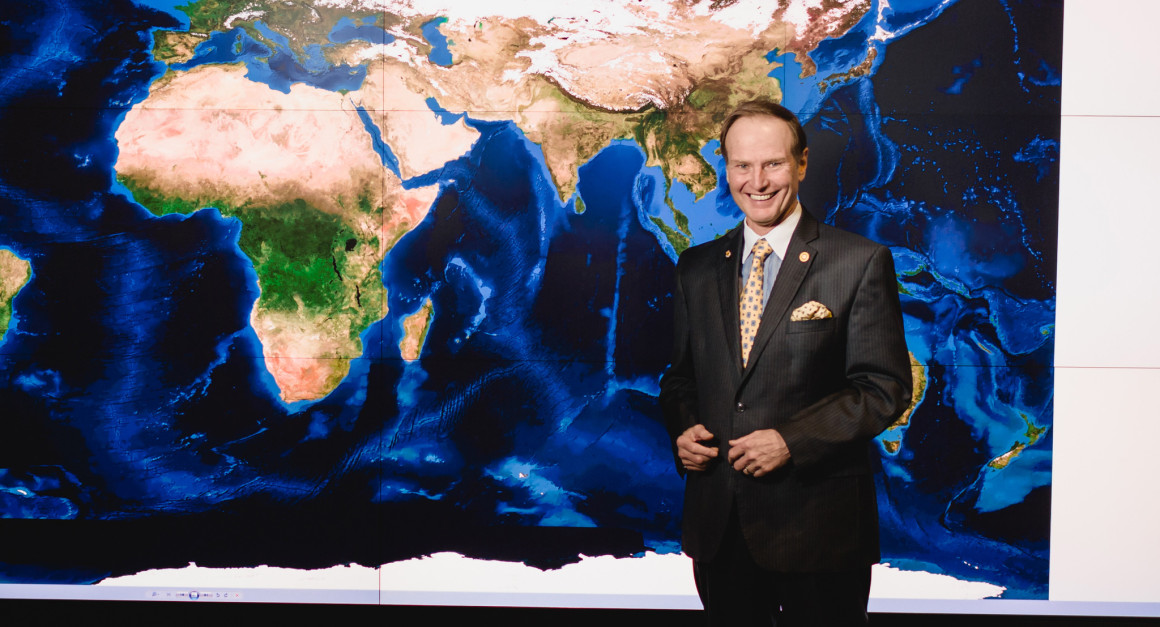
University of Calgary professor talks techno-creep, Harper and predatory advertising
By Susan Anderson, February 12 2015 —
Prime Minister Stephen Harper anti-terrorism legislation to the House of Commons on Jan. 30. Bill C-51 would expand the powers of the Canadian Security Intelligence Service (CSIS), giving them the authority to detain suspects under investigation. Harper says the new powers are necessary to protect Canadians, but critics say that CSIS doesn’t have enough oversight and that the bill limits freedom of expression.
We talked to professor of environmental design and centre for military and strategic studies fellow Thomas Keenan. We asked him about the new legislation, personalized Facebook advertising, the Communications Security Establishment (CSE) — the agency responsible for protecting Canada’s technological information —and something he calls techno-creep.
So what’s techno-creep?
There are things going on that we don’t know about. As an example, if you look at a watch on eBay, and then go to Facebook, an ad will come up for that watch. You’re sort of being stalked and most people have no idea how that happens. There are whole systems — one is called Facebook exchange — where you are sold between the time you looked at the watch and when you logged on Facebook.
What happens is you look at something online, let’s say Skullcandy headphones, but you don’t buy them. That’s now valuable information because you’re obviously interested in them. So there are a number of websites where you’ll go and you’ll be served with an ad.
Where it gets creepy is I feel like I’m being stalked by certain things, like a 24-inch wall oven. When I go to book travel, it will say, don’t you want to buy a wall oven? The reality is that information on me has been sold.
What’s the problem with that?
You start getting the feeling that they know everything. We had some revelations about the CSE, that they are in fact doing very detailed tracking of people who upload and download files. That has come out of a project called Levitation.
They’re looking specifically, they say, for people who are uploading and downloading terrorist-related files. But they will also see if you illegally downloaded a movie or music.
The problem is that they have other information that they could use and it isn’t widely known what they have.
Don’t they have so much data that they can’t spot patterns and specifically track us?
A lot of people think that. But, in fact, we leave pretty good digital identifiers. The simplest one is your IP address. Unless you are doing something to mask that, it’s being sent out.
People can be tracked by their email address. If you keep the same one for a long time and you use it different places, you can go out there and find things out about people just by keying in their email address because it’s become a new identifier.
Do you think that Stephen Harper’s new legislation will be effective?
It should have some effect. It looks a lot like the U.S. Patriot Act that was introduced after 9/11.
How so?
It will create no-fly lists. The minister of national defence will be able to ban people from travelling. This is, of course, if they are suspected of terrorism. The problem is how do you get off that? The minister has to decide to let you off.
The whole way it’s implemented is going to be very important. If they catch terrorists with this, that’s great. But if they’re banning people, I mean, maybe they have the wrong name, or the same name as a terrorist. With the best of intentions of keeping terrorists out of the air, some other people will get scooped up in the net.
What else is the law going to do?
It’s going to give CSIS police powers. CSIS, which has always been an investigation agency, will have the ability to detain people.
It’s not really clear how CSIS is going to be regulated except by a parliamentary committee.
Now there’s the idea of thought crime. If you propose to go blow up a building and they catch you doing that, that’s bad. But if someone just thinks about it or muses about it online, where is the line for that?
How well do you think the bill balances civil liberties and security?
The bill is reasonable. I think the appeal procedures should be a lot clearer for the no-fly list, as opposed to just ‘it’s the minister who decides.’
There’s a clause that CSIS will not take measures to reduce the threat to the security of Canada if those measures will contravene a right or freedom guaranteed by the Canadian Charter of Rights and Freedoms or be contrary to other Canadian law. But they finish the sentence by saying ‘unless the Service is authorized to take them by a warrant issued under Section 21.1.’ So they sort of give and take back. They say, we’re not going to infringe the Charter of Rights and Freedoms, oh but we might.
How do the powers of the CSE and CSIS compare to the private sector?
The private sector doesn’t have, except in certain cases with warrants, the ability to do things like intercept your communications. They certainly don’t have the ability to tell an airline that they can’t fly you. These are all powers that are reserved to government.
Companies can amass a lot of data and they have no obligation to tell you what they have on you. Once you’ve given away that data to them, they can keep it forever. They can use it any way they want.
What’s the biggest problem with all of this surveillance?
It’s largely that we don’t understand it and we don’t understand how it can be knitted together.
There’s this imbalance, the putting together of information that you never thought would be put together.
Interview edited and condensed for print
